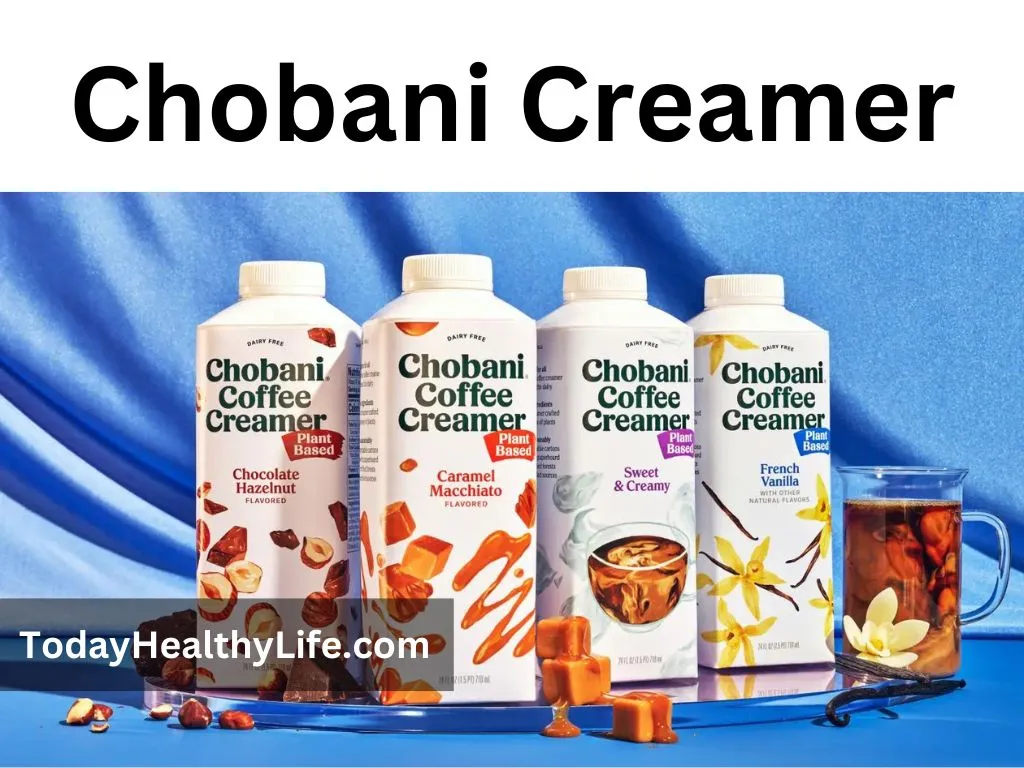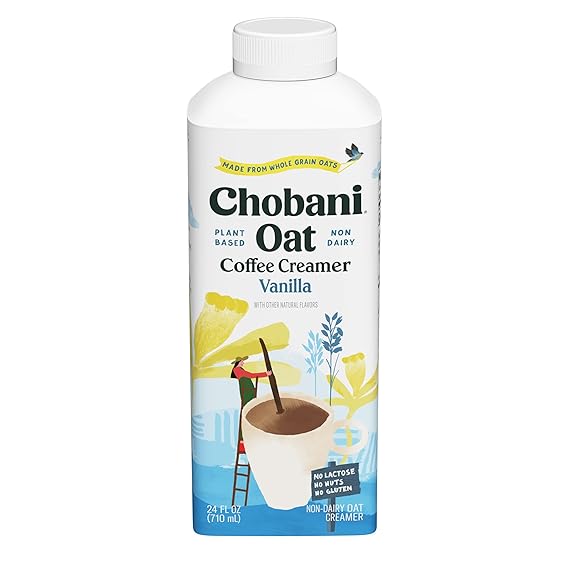“Is Chobani creamer healthy?” – This question has sparked a conversation among health-conscious consumers seeking a perfect complement to their morning cup of coffee.
When exploring our daily rituals, that initial sip of coffee holds a cherished place. Yet, beyond the coffee itself lies the creamer—a source of richness and flavor that elevates the experience.
Chobani, renowned for its yogurt, ventured into the creamer market with its unique line of products, igniting curiosity about its healthfulness.
In today’s era of heightened health awareness, individuals are meticulously analyzing their food and beverage choices, striving for options that merge taste with nutritional benefits.
This discerning approach has prompted a deeper examination of ingredients, nutritional content, and the potential health impacts of everyday consumables.
Chobani’s creamer, stepping into this spotlight, has initiated discussions regarding its ingredients, advantages, and overall impact on health.
This pursuit of a healthier lifestyle, intertwined with the love for that perfect cup of coffee, brings us to the focal question: Is Chobani creamer healthy?
Let’s navigate the intricacies of this query by delving into ingredients, nutritional profiles, and broader health implications in our exploration of Chobani creamer’s place in a health-conscious world.
Table of Contents
What is Chobani Creamer?

Chobani, primarily recognized for its Greek yogurt, expanded its product line to include creamers.
These creamers are designed to complement coffee, offering a creamy texture and a variety of flavors such as Vanilla, Hazelnut, and Caramel.
As with any food or beverage, evaluating its healthiness involves examining several key aspects.
Read: Where to Buy Chobani Coffee Creamer?
Is Chobani Creamer Healthy?
Yes, Chobani creamer can be considered healthy when used in moderation and as part of a balanced diet.
Chobani creamers are typically made from simple ingredients like milk, cream, and natural flavors without high fructose corn syrup or artificial preservatives.
They may also offer lower sugar content compared to some other creamer options on the market. Additionally, they often provide protein due to the dairy components, which can be a positive nutritional aspect.
However, what defines “healthy” can vary based on individual dietary needs and goals.
While Chobani creamers might have fewer artificial ingredients and lower sugar content compared to some alternatives, they still contain fats and calories, so excessive consumption may not align with certain dietary preferences or health conditions.
As with any food or beverage, moderation is key. Incorporating Chobani creamer as part of a balanced diet and considering individual nutritional needs is essential to determine its place in a healthy eating pattern.
Read: How Long is Chobani Creamer Good for After Opening?
Ingredients Analysis
A crucial starting point in assessing the healthiness of any product is its ingredient list. Chobani’s creamer typically includes ingredients like water, cane sugar, sunflower oil, natural flavors, and other additives.
It’s important to note that while some ingredients may raise concern among health-conscious consumers, others may be perceived as relatively benign.
Read: Is Chobani Coffee Creamer Gluten Free?
Cane Sugar:
One contentious ingredient often found in flavored creamers is added sugar. Excessive sugar consumption is linked to various health issues such as obesity, diabetes, and heart disease.
Chobani creamers do contain sugar, but the quantity varies among flavors. Opting for unsweetened versions or being mindful of portion size can help moderate sugar intake.
Sunflower Oil:
Another common ingredient in Chobani creamers is sunflower oil.
While it’s a source of unsaturated fats, which are considered healthier than saturated fats, some people prefer to limit their intake of refined oils due to concerns about processing and potential health effects.
Additives and Natural Flavors:
The inclusion of natural flavors and additives raises questions about their nature and impact on health.
While the term “natural flavors” might sound innocuous, it can encompass various substances, including those derived from natural sources.
However, the specific components are not always disclosed, leading to ambiguity and potential concerns for some consumers.
Read: Does Chobani Creamer Have a Seal?
Nutritional Content
Beyond scrutinizing the ingredient list, assessing the nutritional content is vital in determining a product’s healthiness. Chobani creamers offer varying nutritional profiles based on flavor and formulation.
They provide some essential nutrients such as calcium, but it’s crucial to consider the overall nutritional balance, including fat, sugar, and calorie content.
Caloric Value:
The caloric content of Chobani creamers varies depending on flavor and serving size.
While a small amount might not significantly impact daily caloric intake, excessive consumption could contribute to an increased overall calorie count, potentially affecting weight management.
Fat Content:
The fat content in creamers often comes from sources like oils. Chobani creamers contain saturated fat, though in varying amounts based on the flavor.
For individuals monitoring their saturated fat intake, especially those with specific dietary restrictions or health conditions, this may be a concern.
Protein and Calcium:
On the positive side, Chobani creamers may contain some protein and calcium, albeit in smaller quantities compared to other dairy products.
However, these amounts might not significantly contribute to daily nutritional needs, especially if the creamer is a minor component of one’s diet.
Considerations for Health-Conscious Consumers
For individuals seeking healthier alternatives, several considerations might guide their decision regarding Chobani creamer:
- Portion Control: Being mindful of portion sizes helps in moderating the intake of sugar, fats, and calories. Using less creamer or opting for unsweetened varieties can reduce the overall impact on health.
- Alternative Choices: Exploring alternative creamer options, such as plant-based or homemade alternatives, allows for greater control over ingredients and nutritional content.
- Personal Health Goals: Aligning creamer choices with individual health goals, whether it’s weight management, reducing sugar intake, or adopting a specific dietary approach, helps in making informed decisions.
- Whole Diet Perspective: Evaluating the creamer within the context of the overall diet is crucial. A balanced diet with diverse nutrient sources can mitigate the potential impact of specific food items like creamer.
Is Chobani Creamer Healthy for Weight Loss?
When considering Chobani creamers as part of a weight loss journey, it’s important to acknowledge their potential role within a balanced diet.
While these creamers offer flavorsome additions to your morning coffee, their added sugar content necessitates moderation, particularly for those aiming to shed excess weight.
Understanding the Weight Loss Equation
Weight loss often revolves around managing caloric intake and making healthier food choices.
Chobani creamers, both dairy and non-dairy variations, contain added sugar, which, if consumed excessively, can contribute to an increase in calorie intake and potentially hinder weight loss efforts.
Moderation and Portion Control
The recommended serving size for Chobani creamer is 1 tablespoon. Adhering to this portion size assists in controlling calorie and sugar intake.
Given the American Heart Association’s guidelines recommending limited added sugar intake—no more than 100 calories for women and 150 calories for men per day—it becomes crucial to be mindful of overall sugar consumption, including that from creamers.
Consideration for Weight Loss
For individuals actively pursuing weight loss goals, exercising caution with Chobani creamer consumption becomes paramount.
Using this creamer in moderation, adhering to the suggested serving size, and being conscious of the total sugar intake from all sources can contribute positively to weight management endeavors.
Alternatives for Weight-Conscious Individuals
Exploring alternative options that align better with weight loss objectives is an effective strategy.
Unsweetened almond milk or unsweetened coconut milk offer lower-calorie and lower-sugar alternatives to Chobani creamer.
These alternatives allow individuals to enjoy the creaminess in their coffee while managing caloric and sugar intake more effectively.
Is Chobani Oat Coffee Creamer Healthy?
Absolutely, Chobani Oat Coffee Creamer stands out as a notably healthy option in the realm of coffee creamers.
Let’s delve deeper into the breakdown of its nutritional content per tablespoon to understand why it’s considered a favorable choice for those seeking a healthier addition to their morning coffee routine.
Nutritional Breakdown
Chobani Oat Coffee Creamer offers a compelling nutritional profile, boasting 25 calories and 0.5 grams of fat per tablespoon.
Notably, it contains 0 grams of saturated fat, making it an appealing option for individuals aiming to limit their intake of unhealthy fats.
Moreover, this creamer provides 5 grams of carbohydrates, out of which 2 grams come from fiber—a significant highlight.
The presence of fiber in this creamer is commendable as it contributes to digestive health and aids in creating a feeling of fullness, assisting in appetite control.
Additionally, Chobani’s oat-based creamer contains 4 grams of sugar per tablespoon, which, while relatively low compared to other creamers, still warrants mindfulness in consumption.
Given the American Heart Association’s recommendations for added sugar intake, being mindful of overall sugar intake remains crucial.
Benefits of Fiber and Protein
The inclusion of 2 grams of fiber per tablespoon in Chobani Oat Coffee Creamer is a noteworthy advantage.
Fiber is an essential component of a balanced diet, known for its role in promoting digestive health and contributing to a sense of satiety, assisting in weight management efforts.
Furthermore, this creamer also offers 1 gram of protein per tablespoon, which aids in tissue repair and muscle building—an additional benefit that adds to its nutritional value.
Moderation and Healthy Consumption
While Chobani Oat Coffee Creamer presents itself as a healthier option with its lower calorie, fat, and sugar content, it’s imperative to reiterate the importance of moderation.
Being mindful of portion sizes and considering overall sugar intake in one’s diet remains key, aligning with general recommendations for a healthier lifestyle.
Conclusion
So, is Chobani creamer healthy? Yes, Chobani creamer stands as a relatively healthy option among coffee creamers.
With lower calories, fats, and sometimes sugars compared to traditional creamers, it caters to diverse dietary preferences.
While containing added sugar, moderate consumption within recommended servings aligns with a balanced diet.
Chobani’s commitment to plant-based alternatives and catering to specific dietary needs reflects its adaptability to consumer preferences.
Pairing it with natural sweeteners or exploring low-calorie options like unsweetened almond or coconut milk can enhance its place in a health-conscious diet.
Ultimately, mindful consumption, moderation, and considering individual dietary habits are key in integrating Chobani creamer into a healthy lifestyle.
Opting for diversity and informed choices tailored to personal nutritional needs remain pivotal in fostering a balanced diet and overall well-being.
FAQs:
Chobani coffee creamer is a line of dairy and non-dairy creamers designed to enhance the flavor and creaminess of coffee.
Chobani offers various flavors such as Vanilla, Hazelnut, Caramel, and others. The creamers are formulated to cater to different dietary preferences, including those who prefer dairy-free or plant-based options.
Determining the “healthiest” coffee creamer can vary based on individual dietary needs and preferences.
However, healthier options typically include creamers with lower calories, fats, and added sugars.
Options like unsweetened almond milk, unsweetened coconut milk, or Chobani’s oat-based creamer often rank as healthier choices due to their lower sugar and calorie content compared to many traditional creamers.
Chobani creamer ingredients include a mix of natural and synthetic elements. While the creamers avoid artificial flavors and preservatives, they do contain natural flavors and added sugars.
The term “natural flavors” can encompass various components derived from natural sources, though specifics aren’t always disclosed.
Chobani emphasizes using fewer additives, aiming for a more natural profile compared to some other creamer brands.
The sugar content in Chobani’s plant-based creamer varies by flavor. Generally, the plant-based creamers contain around 4 grams of added sugar per tablespoon.
While this amount of sugar is relatively moderate compared to some creamers on the market, it’s important to be mindful of overall sugar intake, especially for those watching their sugar consumption.
Chobani, primarily known for its Greek yogurt, hasn’t entirely transitioned its product line to organic options due to various factors.
While the company has taken steps to use fewer artificial ingredients and additives in its products, the decision to not exclusively produce organic items might stem from factors such as sourcing, cost, and market demand.
Chobani has, however, introduced some organic offerings within its product range but has not made a complete shift to entirely organic products.


